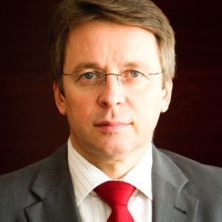Ivan Mikloš is convinced that current situation in the budgetary process and broader public finance area in Ukraine, it strongly reminds of the situation in Slovakia in 2002. Public finance reform including the change of the budgetary process have played a very important role in solving situation. Another important reform that changed the budgetary process was fiscal decentralization.
When I see the current situation in the budgetary process and broader public finance area in Ukraine, it strongly reminds me of the situation in Slovakia when I became the Deputy Prime minister and the Minister of Finance in the second Dzurinda government in 2002. An excellent analysis of Ilona Sologoub reminded me of it even more. As she concluded, the budget process in Ukraine has been “quite chaotic and highly dependent on political conditions”. And it still is, I have to add, and that is the strong reason for necessary changes in this important area.
At the end of 2002 we in Slovakia created a center-right four-party coalition with a very ambitious economic program. 2003 was the year of preparing the comprehensive, complex package of structural reforms (tax reform, fiscal decentralization, social system reform, labor market reform, pension reform, healthcare reform). Among them public finance reform including the change of the budgetary process played a very important role. Its main objectives included the following:
- Increase the transparency of public finances. To achieve this goal, we adopted the European System of Accounts (ESA) 95 method. Recalculating the cash deficit using the ESA-95 method showed just how misleading our public finance data were. In 2000, for example, the government reported a deficit of 3.4 percent of GDP. The ESA-95 recalculation revealed the deficit of 12.3 percent.
- Adopt program-based and multi-year budgeting. These measures increased the government’s ability to monitor the effectiveness of public resource outlays.
- Improve the analytical quality of macroeconomic and tax analyses and forecasts. We strengthened the analytical capabilities of the Ministry of Finance by creating the Institute for Financial Policy, a unit that became the government’s main analytical center. We passed a law that created two committees composed of well-respected and independent experts whose task was to evaluate the accuracy and quality of the Finance Ministry’s macroeconomic and tax forecasts. By publishing the committees’ conclusions alongside the official forecasts, we depoliticized discussion of the level of public and tax revenue. As a result, political debate focused on the level of the deficit (or surplus) and the distribution of public resources.
- Adopt new rules that restrict the use of public resources. We repealed the widespread state guarantees for business loans and eliminated nearly all state-run funds.
- Establish the State Treasury and the Debt and Liquidity Management Agency. Since 2005 all financial flows in the public sector have been concentrated at the State Treasury. This policy yielded both direct and indirect savings in public finances. The Debt and Liquidity Management Agency is responsible for the operational management of the state debt. Strategic management of the public debt has remained the purview of the Ministry of Finance.
Another important reform that changed the budgetary process was fiscal decentralization. We significantly strengthened local and regional authorities’ responsibility for imposing and collecting local taxes. We also included into the law the criteria for redistribution of almost all revenues from the personal income tax to the local and regional self-governments. These criteria were based on the number of inhabitants, share of children and pensioners, the community or region area etc. Part of this reform was also the redefinition of local authorities’ original competencies that are fully under their responsibility. This reform strongly increased their responsibility and independency as well as predictability and stability of their budgetary resources.
After implementing all the above changes budgetary process was really altered, and differences between a draft submitted by the government and the budget adopted by the Parliament were minimized as well as the necessity to amend the budget during the year.
There is a consensus now that estimation of revenues for the next year budget is clearly the professional issue for experts at the Ministry of Finance, but the accuracy and quality of these estimates are assessed by the best independent experts and the results of this assessment is published. The main question and task for the government is then to propose the level of expenditures (revenues plus deficit or revenues minus surplus) and the structure of expenditures. Professional estimation of revenues as well as overall level of expenditures are then fully respected in the Parliament and proposals for changes are oriented only at altering the structure of expenditures as compared to the government draft. If any MP or faction proposes a change that increases expenditures or decreases revenues, there is an unwritten rule that at the same time it has to propose the source for covering of fiscal costs of these changes. In other words, all amendments have to be at least fiscally neutral.
Budget Week
Budget Process: Set the Rules or Cancel the Game (Ilona Sologoub, KSE-KEI Research Associate, VoxUkraine Editorial Board member)
Sergey Aleksashenko: Budget Process Cannot be More Stable than the State (Sergey Aleksashenko, Non-Resident Senior Fellow Brookings Institution (Washington DC), Former deputy minister of finance of Russia, Former first deputy Governor, Bank of Russia)
In 2010 – 2012, when I was the Finance minister for the second time, we further strengthened professionalism, transparency and independent assessment of the budgetary process. We passed the constitutional law on creation of an independent “Budgetary responsibility council” responsible for examination and assessment of transparency, accuracy and quality of the budgetary process. This constitutional law also imposed very strict and enforceable measures and limits for the government in case of public debt growth over the limits defined by the law.
The only important tool that is missing in Slovakian budgetary process is expenditure ceiling. We didn’t establish it, and the current government rejects to do this although they originally agreed with this. The idea is that there is a midterm goal for the public finance deficit (for instance balanced budget, or 1% deficit) and until this goal is achieved, even in the case of revenue increase, the expenditure ceiling cannot be exceeded. As a result, higher revenues will be materialized in quicker public finance consolidation rather than spent on higher expenditures.
Changes that we imposed to the budgetary process in Slovakia during the last twelve years are fully in line with general tendencies in the developed countries during the last more than two decades. As Anders Aslund pointed in his book “Ukraine. What went wrong and how to fix it”:
“Around 1990, several Western countries went through financial crises, notably New Zealand, Australia, Sweden and Finland. One of their conclusions was to establish a more orderly budget process, giving the ministry of finance greater authority. These reforms involved many steps.
To begin with, the budget process had to be strictly controlled, timely and orderly. It should also be transparent to preclude the hiding of illicit claims in the budget. The ministry of finance managed the budget process centrally, which strengthened it in relation to other “demanding” ministries and made it easier to pursue national financial objectives, such as a balanced budget and limited public debt. The discretionary powers of the parliament’s budget committee and the parliament in general were curtailed. A rising view is that a parliament should receive the budget only to vote it up and down. All these measures aimed at minimizing the opportunities for lobbyism and corruption.
The Ukrainian parliament, by contrast, is notorious for its impulsive lobbyism. All of a sudden a couple of businessmen-parliamentarians propose a legal amendment to divert some budget funds to a favored interest of theirs, and before anybody has figured out what is going on, they have had the funds legally allocated.”
If Ukraine really wants to be changed, then this time has to be different. There are many areas that will be proving test of the real change. One of the most important will be the budgetary process improvement as well as the tax reform. Both of these areas are closely interrelated and in both of them real change is preconditioned by the strengthening position of the Finance Ministry in relations with the Parliament. The next few weeks and months will prove if this time is different.
Attention
The author doesn`t work for, consult to, own shares in or receive funding from any company or organization that would benefit from this article, and have no relevant affiliations



